
Topics
Guests
- Toby Jonesassociate professor of history and director of Middle Eastern studies at Rutgers University. He is the author of Desert Kingdom: How Oil and Water Forged Modern Saudi Arabia. Jones was previously the International Crisis Group’s political analyst of the Persian Gulf.
King Abdullah bin Abdulaziz of Saudi Arabia has died at the age of 90. Abdullah was one of the world’s most powerful men and a key U.S. ally in the region, controlling a fifth of the known global petroleum reserves. In a statement, President Obama praised Abdullah “as a force for stability and security in the Middle East and beyond.” Many analysts accused Abdullah of turning the uprising in Syria into a proxy war with Iran. In 2010, WikiLeaks published U.S. diplomatic cables which identified Saudi Arabia as the world’s largest source of funds for Islamist militant groups. Abdullah also sent tanks to help squash pro-democracy uprisings in neighboring Bahrain. Saudi Arabia recently came under criticism for its treatment of imprisoned blogger Raif Badawi, who was sentenced to 10 years in prison and 1,000 lashes to be carried out at a rate of 50 per week for charges including insulting Islam. Abdullah’s half-brother, Crown Prince Salman, has now assumed the throne. We are joined by Toby Jones, director of Middle Eastern studies at Rutgers University and the author of “Desert Kingdom: How Oil and Water Forged Modern Saudi Arabia.”
Transcript
AMY GOODMAN: We turn now to Saudi Arabia.
JUAN GONZÁLEZ: Yes, well, in Saudi Arabia, the funeral for the Saudi king, Abdullah, has begun. He died on Thursday at the age of 90. His brother Salman will now become king of the oil-rich monarchy. The White House announced Vice President Joe Biden would travel to Saudi Arabia to offer condolences. King Abdullah was one of the closest U.S. allies in the region. In a statement, President Obama praised him, saying, quote, “As a leader, he was always candid and had the courage of his convictions. One of those convictions was his steadfast and passionate belief in the importance of the U.S.-Saudi relationship as a force for stability and security in the Middle East and beyond.”
AMY GOODMAN: While President Obama described Abdullah as a force of stability in the Middle East, analysts, many, accused Abdullah of turning the uprising in Syria into a proxy war with Iran. In 2010, WikiLeaks published U.S. diplomatic cables which identified Saudi Arabia as the world’s largest source of funds for Islamist militant groups. King Abdullah also sent tanks to help squash pro-democracy uprisings in neighboring Bahrain. Saudi Arabia recently came under criticism for its treatment of imprisoned blogger Raif Badawi, who was sentenced to 10 years in prison and 1,000 lashes to be carried out at a rate of 50 per week for charges including insulting Islam. He runs a political blog—or did, until he was imprisoned.
For more on the future on King Abdullah and the future of Saudi Arabia, we’re joined via Democracy Now! video stream by Toby Jones, associate professor of history and director of Middle East studies at Rutgers University. He’s also the author of Desert Kingdom: How Oil and Water Forged Modern Saudi Arabia, previously the International Crisis Group’s political analyst of the Persian Gulf.
Toby Jones, welcome back to Democracy Now! Talk about the death of King Abdullah.
TOBY JONES: Well, Abdullah’s death of course marks a transition. It’s getting a lot of attention. I think, as you pointed out in the lead up here, you know, his record is not quite as positive or rosy as a lot of people are reflecting upon this morning. He came to power formally in 2005, celebrated as a potential reformer, as somebody who would modernize and lead the kingdom forward. But it turns out he’s largely failed on every one of those measures. He has turned the clock back in terms of inciting sectarianism at home and supporting the forces of radicalism abroad. Or, if we want to read this in some slightly more benign way, he’s at least not cracked down on the domestic forces at home that have sought to incite things like sectarianism. He burned bridges with Iraq. He saw the Arab Spring, the uprising in Syria, as an opportunity to challenge both Iran and Assad’s power there, knowing full well what the possibilities of blowback and the rise of a kind of new regional terrorism might be. They supported instability in Yemen. They’ve crushed pro-democracy forces in Bahrain. Look, Abdullah is somebody who was well liked in the West. He might have been admired by a large section of Saudi society. But his record is one that’s consistent with his predecessors: It’s at odds with democracy, with human rights and with all of the things that we’re supposed to value.
JUAN GONZÁLEZ: And about that last point, Professor Jones, what is the state of human rights and democracy in the Saudi kingdom?
TOBY JONES: Well, it’s as bad as it’s ever been. You know, I mean, you mentioned Badawi, in the lead up here, being sentenced to a long prison term and, of course, now subject to flogging publicly, a thousand lashes. I mean, this might seem outlandish, but this is sort of common practice in Saudi Arabia. Its prisons are full of political prisoners—they have been for quite a long time—including Islamists, suspected terrorists, as well as liberals and others who champion the cause of reform and human rights. There’s been a steady string of arrests and detentions over the last few years. We pay attention now because of the crude, kind of terrible nature of what’s involved in public beheadings and this kind of Medieval punishment of lashing people for speaking their minds, but this has been going on in Saudi Arabia for quite a long time.
I mean, it’s worth remembering that in 2002, 2003, Abdullah, when he was crown prince—although not formally the king, was nevertheless still in a position of political primacy—became a darling of the reform lobby and kind of the—what we might call the moderate political wing of Saudi Arabia’s domestic political society. He was seen as a reformer. He was embraced by a broad cross-section of folks who believed that Saudi Arabia, following 9/11, following the decade of the 1990s in which there was a kind of brutal politics and crackdown on dissent, that he was going to be the person who spearheaded a period of liberal opening. And it turns out that he turned against all of his domestic allies. When he saw opportunities to crush and push back against those who might challenge Saudi political primacy, he did so. And he did so as crudely as any of his predecessors did. He was not a benevolent dictator. He was a dictator.
AMY GOODMAN: Can you talk about the man who will succeed him, King Salman? There is some information, or is it rumors, that he has dementia?
TOBY JONES: Well, I mean, look, a lot of people claim to have insight into the internal politics of the royal family. And I would caution against saying that we know too much. I mean, Salman is not a young man. I mean, he’s at least 79, if not older than that. So he’s been in a—you know, he’s been around for quite a long time. Who knows how long his reign will be? If he is suffering from health issues, you know, the royal family is not going to let us know too much about that. There has been speculation that he’s suffering from dementia. And it’s likely that his reign will be a short one and that there are powers behind the throne that will make sure that the interests of the royal family will be protected, much like Abdullah and his predecessor, Fahd. The family protects itself. There is an arrangement likely in place in which the king is the first amongst equals; nobody can act too radically or too out of step with the interests of the family more broadly.
So Salman’s reign will be probably very consistent and similar to that of Abdullah’s. He’ll be a figurehead. He will likely wield some kind of influence, as will those who are closest to him, as will his successor, the, like, current crown prince, who is probably about a decade younger, Muqrin. But the reality here—and I think one of the things we get caught up in is we get caught up in the politics of succession in Saudi Arabia, and will there be a changing of the guard that leads to some fundamental transformation. The odds are very low that that’s going to happen. The royal family’s interests are in protecting themselves first, their privilege second, and making sure that there are limited challenges to their authority. They’re very good at this, and they have been for over half a century.
JUAN GONZÁLEZ: And the role of the Saudi family or the Saudi elite in the continuing financing of jihadists around the world?
TOBY JONES: Well, I mean, Saudi Arabia is of course a wellhead for a certain kind of ideological thinking and production. There’s a lot of talk about Wahhabism and the similarities between what is the official orthodoxy of the Islamic—of the Saudi state and groups like al-Qaeda and ISIS and others. And I think those ideological connections matter. There are certainly—there are certainly operators on the ground. There is support within Saudi mosques for precisely these kinds of networks. The Saudi state is in a much more difficult—and the royal family, a much more difficult—position. They view—I think we have to be careful here. I think they view the regional political landscape through the lens of kind of good, old-fashioned geopolitics. I mean, they see Iran as a rival. They see Assad as a pawn in all of that game. And they understand that they have a kind of limited playbook, that there are kind of natural alliances with which they can—which they can forge mutual interests and cooperation. And the Islamists happen to be among those. But I don’t think the royal family is necessarily an ideological actor in the same way that some of the preachers and clerics in Saudi Arabia are. But they reach out because they have to, to these networks. They’re dealt a certain hand, and they play the game in the way that they best can.
But this is a dangerous proposition—it was that way in Afghanistan in the 1980s, it was that way in Iraq after 2003—where the Saudis forge alliances, or they at least allow those that are sort of on the margins of the government to fund and support networks that are also simultaneously dangerous to the regime itself. That’s why they’re building a big fence on their border with Iraq. On the one hand, they’d like to see ISIS do damage in Syria, but they don’t want to see it come home. But, look, over the long term, this is an unsustainable, untenable proposition. The Saudis are eventually going to have to deal. They’re going to have to reckon with the blowback from Syria and Iraq. They’d like to postpone it as long as possible, but it’s likely inevitable.
AMY GOODMAN: And the relationship between Saudi Arabia and the United States, Toby Jones?
TOBY JONES: Well, this is a long-standing and complicated one. It’s often framed, as Obama mentioned or as others will likely remark today, that it’s framed through the lens of security and stability. And that certainly matters from the perspective of both Saudi and American policymakers. If we peel back the layers of what this means, though, it’s not always clear. It’s not as though the Saudis have any power to really shape the region or defend their interests militarily. They’re largely dependent on the United States for security assurances. The U.S. has happily projected its military power into the Persian Gulf since at least the early 1970s, if not earlier than that.
I mean, I think what this really comes down to is that the Saudis are the world’s most important oil producer. They have been for quite a long time. For that reason, they’ve been in the American political orbit since at least the late 1930s. And the oil functions in important ways. It functions because it’s the American—Americans see it as important to the global economy, to our own domestic political economic health. And we see Saudi Arabia as an important player in that respect. But oil wealth also does a lot of other things. It gets recycled to the American economy, especially with the purchase of weapons. And these all become entangled with Saudi Arabia. Our relationship is not just about providing security for oil. It’s about maintaining a certain kind of strategic and economic relationship that profits both sides.
AMY GOODMAN: Toby Jones, we want to thank you for being with us, associate professor of history and director of Middle East studies at Rutgers University, author of Desert Kingdom: How Oil and Water Forged Modern Saudi Arabia.
This is Democracy Now! When we come back, we’ll talk Ferguson. What about the Justice Department not bringing civil rights charges against the police officer who killed Mike Brown? And then we’ll talk about a Supreme Court decision you might not have learned about this week, a major decision on behalf of whistleblowers. Stay with us.

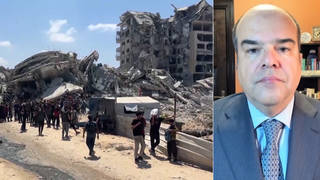
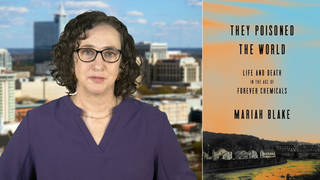
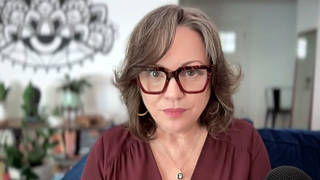
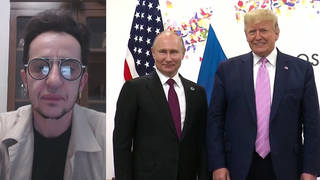





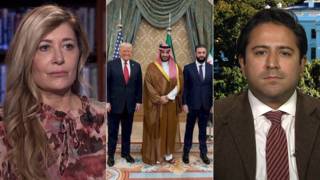

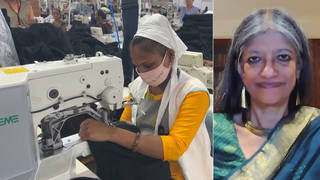
Media Options